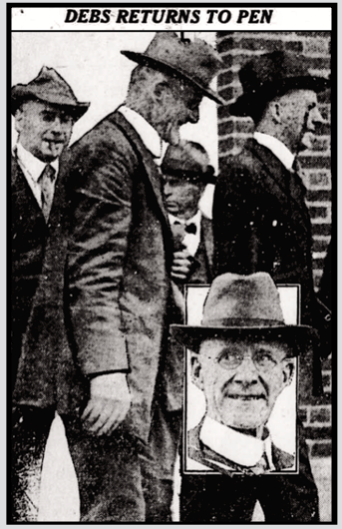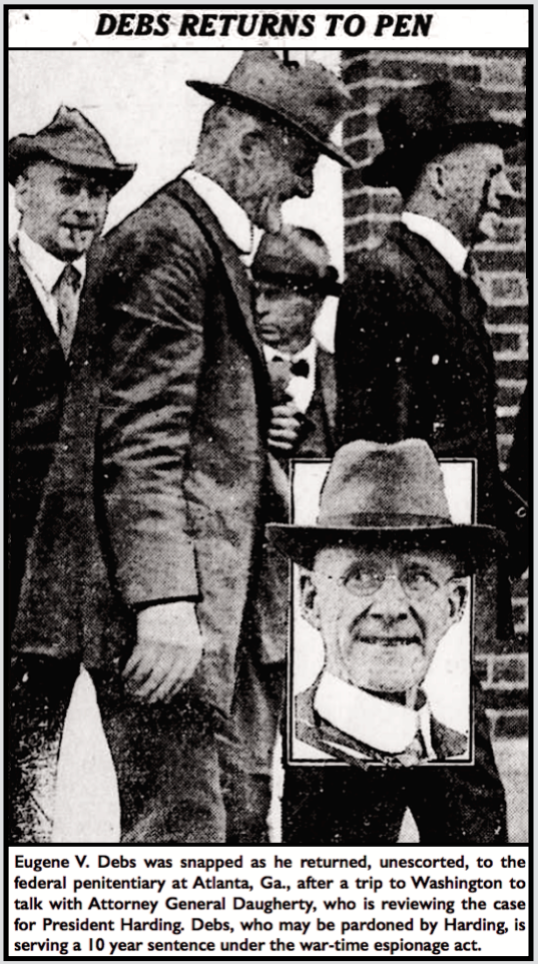 —————
—————
Hellraisers Journal – Tuesday April 5, 1921
Atlanta Federal Penitentiary – Debs Returns After Unguarded Visit to Washington
From the Appeal to Reason of April 2, 1921:
Dramatic Story of Debs’ Sensational Visit
to Attorney General DaughertyBY SAMUEL CASTLETON
Personal Attorney for Eugene V. Debs
and member of Debs Amnesty Lobby.By Telegraph to the Appeal.
Atlanta, Ga.—In spite of the mysterious secrecy that shrouded Gene Debs’ dramatic departure for Washington to hold his conference with the United States Attorney General, a leak was sprung from the effort to suppress all information about his movements when it became rumored a few hours after his departure that he had been pardoned and had left the city.
I immediately telegraphed to the Appeal’s Amnesty Lobby in Washington for Verification at the department of Justice. The rumor also had reached the city editors of the three Atlanta newspapers and reporters went scurrying to the federal penitentiary in taxi cabs and to the office of the Warden. Some of them even went at midnight to the Federal prison farm on the McDonough road ten miles from the outskirts of the city, over almost impassable highways. All communication with the prison officials was completely shut off and it was impossible to obtain either a verification or denial of the rumor. An error of the Western Union Telegraph Company caused my message to Washington to miscarry and I was unable to learn anything from that source.
The next day the Attorney General issued a statement relating to the conference between Debs and himself. Then it became known in Atlanta that the rumor of the day before was partially based on facts and that Gene had been extended an invitation by the Attorney General to clarify misunderstandings.
I was certain that this administration, well as the preceding one, knew that Gene was adamant and uncompromising in his principles and ideals and that the administration did not summon him for the purpose of the decantation of his convictions or retraction of his views.
The effect of the announcement that he was on his way back to Atlanta, alone and unguarded, was electrifying to both his comrades and the pubic.
The picturesque pilgrimage of Gene appealed to the American imagination and thousands of Atlantans who had read of him daily in the newspapers and knew him only by reputation began to anticipate a glimpse of him upon his return.
I was informed by a Washington dispatch that Gene had left there on the Birmingham local at 2:20 o’clock Thursday afternoon and would arrive in Atlanta at 11:30 o’clock Friday morning, March 25.
The last stop the Birmingham special made before reaching the Peach street station was at Duford [Buford], a village forty miles north of here. Accompanied by Rhodes McPhial, a true comrade who has often helped me serve Gene, I left Atlanta on a local train for Duford [Buford] at 6:20 o’clock Friday morning, and we arrived there two hours before Gene’s train was due. We were absolutely determined to observe all prison regulations and further to see that newspapermen did not embarrass him upon his arrival here.
It was a damp morning, with a threatening drizzle. It was one of those mornings when a man enjoys a soothing puff of a cigar in the smoking car as he gazes dreamily at the rolling panorama along the railroad trackage of Georgia.
Both of us were thoroughly alert with a sense of expectancy as the Birmingham special rounded a curve and slowed down at the Burford [Buford] station.
We got aboard and I espied David H. Clark of the Amnesty Lobby who had boarded the train at Washington, but was unaware that Gene was also a passenger until he had read an account of it in one of the southern newspapers. I was puzzled for a moment when Clark told me that Gene had denied himself to all visitors, including him.
However, we proceeded to the observation car where we found Gene. I had determined that I would not speak to Gene until he would advise me that it was not a violation of any prison rule or regulation.
Gene was wrapped in the composition of a poem which he was writing on a scratch pad resting on his knee. A black hand bag was at his feet. He was clad in an ill-fitting cheap suit of purple spotted gray and wore a gray soft hat. A blue stripped tie and a collar too large for him were about his neck.
Gene’s eternally radiant enthusiasm was still with him. What transpired at the capital conference is history and not to be divulged for publication at this time, but I know that Gene was favorably impressed with the courteous treatment extended to him by both U. S. Attorney General Daugherty and Solicitor General Goff. The enlightened reader can visualize the scene at the capitol and hear the eloquent plea made by this brave champion of the proletariat and his fearless defense of the cause of freedom of speech as involved in the case of all political prisoners.
I inquired about the condition of Gene’s heart and whether he was suffering from the periodical attacks of lumbago, and true to his sunny disposition, he said: “Sam, I am feeling all right. The only thing necessary for me to feel perfect is to get into action.”
On his death-bed Gene will say: “Comrade, I am feeling fine.” And with his kindly smile add, “Boys, don’t worry about me.”
Arriving at Atlanta, a large and eager gathering were awaiting to get a glimpse of the famous man whom they admired. Movie men danced wildly around to catch Gene in every conceivable pose. Newspaper photographers were busy snapping him. Reporters asked for a statement from him. He denied himself to all of them.
In addition to this group of admirers, a host of aristocratic looking women turned out to see him and they piloted Gene through the crowd and went over to the Warden. And then we were whisked away in automobile.
The Warden and Gene were in animated conversation.
“Is this the main street?”
“Yes, this used to be the fashionable residential section of the city,” informed the Warden, “but now the automobile people are making a business street out of it.”
“What place it that?” asked Gene, bending over the steering wheel while the Warden made room for him to crane his neck and get a glimpse. “That’s the Georgian terrace. Across the way is the Ponce Deleon.”
Soon we were out of the congested traffic and Gene hopped out of the automobile to go into the postoffice to attend to the mailing of some letters.
“Good-bye, Sam.” He embraced me. Send those to Kate. Her address is—”
“I know, Gene. I’ll attend to it.”
So we parted. His last thought was his message to his home and family at Terre Haute, Ind.
—————
[Photograph and emphasis added.]
From The Rock Island Argus and Daily Union of April 1, 1921:
~~~~~~~~~~~~~~~~~~~~~~
SOURCES
Quote EVD if Crime to oppose bloodshed, AtR p1, Oct 23, 1920
https://www.newspapers.com/image/612855160/
Appeal to Reason
(Girard, Kansas)
-April 2, 1921
https://www.newspapers.com/image/612855449/
IMAGE
EVD Returns to Pen ed, Rock Island (IL) Argus p15, Apr 1, 1921
https://chroniclingamerica.loc.gov/lccn/sn92053933/1921-04-01/ed-1/seq-15/
See also:
New York Tribune of March 26, 1921 states Debs left Atlanta on Wednesday morning (Mar 23rd) and returned on the 25th.
https://chroniclingamerica.loc.gov/lccn/sn83030214/1921-03-26/ed-1/seq-1/
Apr 2, 1921, Appeal to Reason-Debs Comes to Washington Unguarded by John W Gunn
https://www.newspapers.com/clip/75150242/apr-2-1921-appeal-to-reason-debs/
Apr 9, 1921, Appeal to Reason-“Attorney General Did Not Ask Debs to Quit Cause”
https://www.newspapers.com/clip/75150097/apr-9-1921-appeal-to-reason-attorney/
War Shadows
A Documental Story of the Struggle for Amnesty
-by Lucy Robins
Central labor bodies conference for the release of political prisoners, 1922
https://books.google.com/books?id=6VE2AQAAMAAJ
-first ad found:
Everett Labor Journal of May 12, 1922
https://www.newspapers.com/image/62926315/
Page 303: Debs’ Dramatic Appearance at Capitol
https://play.google.com/books/reader?id=6VE2AQAAMAAJ&printsec=frontcover&pg=GBS.PA303
Tag: Sam Castleton
https://weneverforget.org/tag/sam-castleton/
~~~~~~~~~~~~~~~~~~~~~~~~~~~~~~~~~~~~~
We Will Sing One Song – Six Feet in the Pine
Lyrics by Joe Hill


